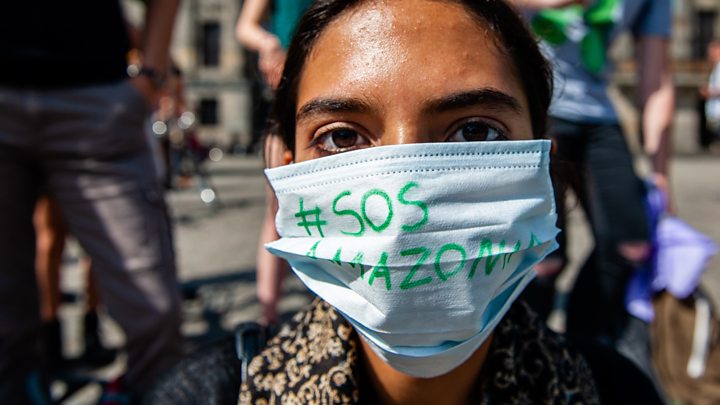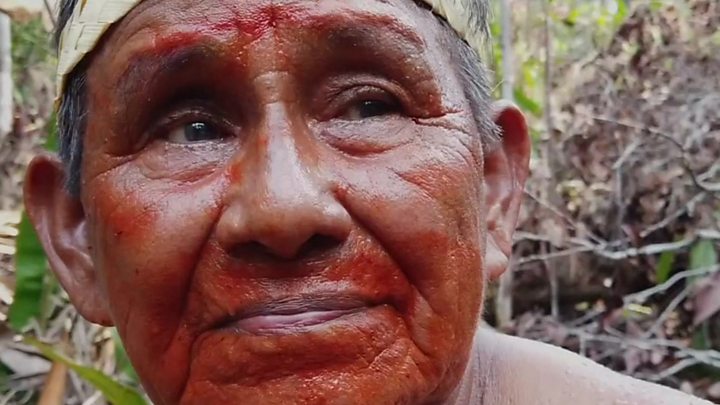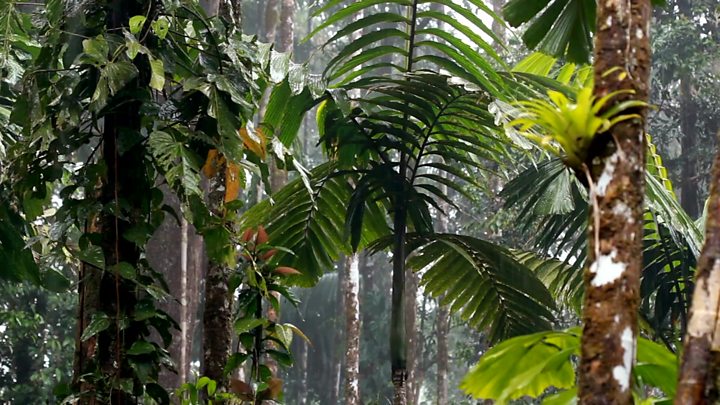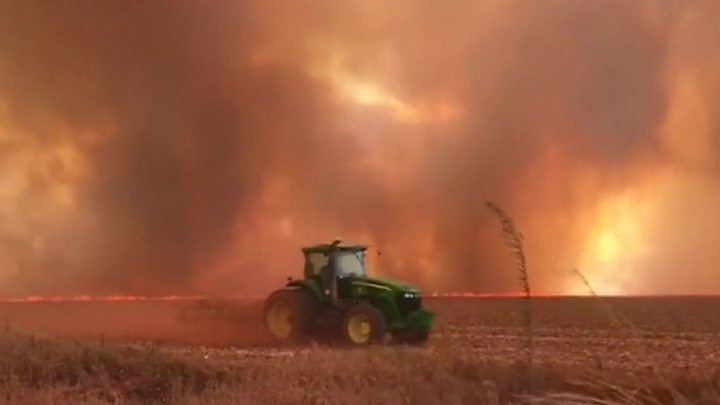Home » Latin America »
Brazil fines for environment crimes plummet
The record number of fires in Brazil’s Amazon rainforest has coincided with a sharp drop in fines for environmental violations, BBC analysis has found.
Official data from Brazil’s environment agency shows fines from January to 23 August dropped almost a third compared with the same period last year.
At the same time, the number of fires burning in Brazil has increased by 84%.
It is not known how many of these fires have been set deliberately, but critics have accused President Jair Bolsonaro’s administration of “green lighting” the destruction of the rainforest through a culture of impunity.
Mr Bolsonaro has sent in the military to help put out the fires after coming under pressure from the international community, saying he wanted to “help protect” the Amazon.
The largest rainforest in the world, the Amazon is a vital carbon store that slows down the pace of global warming. It is known as the “lungs of the world” and is home to about three million species of plants and animals, and one million indigenous people.
What does the data show?
Analysis by BBC Brasil shows the number of fines handed out by the Brazilian Institute of Environment and Renewable Natural Resources (Ibama) for environmental violations has dropped significantly since Mr Bolsonaro took office on 1 January.
Why has there been a drop?
Neither Ibama nor the ministry of the environment answered the BBC’s queries about the figures.
Mariangélica de Almeida, a professor of environmental law who has defended clients over unfair fines, suggested to BBC Brasil that the figures for previous years could have reflected a culture of over-fining, in order to meet goals.
However, others have pointed the finger directly at Mr Bolsonaro, who has scorned environmental activists and declared his support for clearing areas of the Amazon for agriculture and mining.
Elisabeth Uema, who retired from Ibema last year, said it was clear even before Mr Bolsonaro was elected that he did not like Ibema. During his campaign, he pledged to limit fines for damaging the rainforest and to weaken the influence of the environmental agency.
The message was further underlined in April when Mr Bolsonaro ordered an investigation into officials who burned tractors and trucks belonging to loggers who were allegedly involved in illegal activities in the Jamari National Forest. This was a long-held policy seen as a deterrent against illegal loggers.
The agency’s work, she said, had also been hampered by the fact that just eight of its 27 offices across the country now had a permanent head.
“The usual inspections, which had been planned since 2018, are happening. But little beyond that,” Ms Uema, now the executive secretary of Ascema Nacional, the body representing Ibama employees, told BBC Brasil.
Critics of the Bolsonaro administration insist the drop in fines does not mean fewer crimes against the environment are being committed.
Staying true to his word
Analysis by Luis Barrucho, BBC Brasil
The decline in the number of environmental fines at a time when Brazil has seen a spike in deforestation does not seem a coincidence to many.
During last year’s presidential race, Mr Bolsonaro vowed to open up the Amazon for commercial activity. When he was sworn in, he stayed true to his word.
Many of his critics say that Mr Bolsonaro operates a double standard when it comes to addressing environmental crimes, most of which remain unpunished. After all, the president promised a tough stance on criminal activity.
Now, in face of national and international pressure, Mr Bolsonaro appears to have changed his tone and finally adopted measures to battle the fires.
But he still hasn’t acknowledged the link between the fires and the increase in deforestation in Brazil this year. And in a televised address on Friday he reinforced his plans to bring “economic dynamism” to the Amazon.
The question now is whether Mr Bolsonaro’s recent moves in fighting the fires will be accompanied by a consistent change in his environmental policies.
Why does this matter?
Environmental activists have drawn links between Mr Bolsonaro’s attitudes towards the environment and the recent surge in the number of fires in the Amazon rainforest.
Satellite data published by the National Institute for Space Research (Inpe) has shown an increase of 85% this year in fires across Brazil, most of them in the Amazon region.
Mr Bolsonaro initially brushed it off, arguing that it was the season of the “queimada”, when farmers burn land to clear it before planting.
The president has also previously questioned data from Brazil’s National Space Research Institute which showed an 88% increase in deforestation in June compared with the same month a year ago.
But Inpe has noted that the number of fires is not in line with those normally reported during the dry season.
Wildfires often occur in the dry season in Brazil but they are also deliberately started in efforts to illegally deforest land for cattle ranching.
Whether there will now be a spike in fines remains to be seen.
What is being done to fight the fires?
On Friday, Mr Bolsonaro confirmed that he had authorised the armed forces to help fight the fires. “I’ve learned as a military man to love the Amazon forest and I want to help protect it,” he said.
The decree itself was fairly vague in its wording, but specified that the military would be deployed to nature reserves, indigenous lands and border areas in the region.
Brazil’s defence minister says he expects $6.7bn (£5.4bn) to be made available for the army operations, confirming a helicopter and two airplanes have been deployed to the Amazon to help identify fire outbreaks and to carry equipment and military personnel.
The announcement came after the international community began to exert pressure on Mr Bolsonaro.
German Chancellor Angela Merkel, French President Emmanuel Macron and UK Prime Minister Boris Johnson have called the fires an international crisis.
France and Ireland have also said they will not ratify a large trade deal with South American nations and Finland’s finance minister has called on the EU to consider banning Brazilian beef imports.
Both Ms Merkel and Mr Macron said the issue must be discussed at this weekend’s G7 summit in Biarritz, France.
Source: Read Full Article






